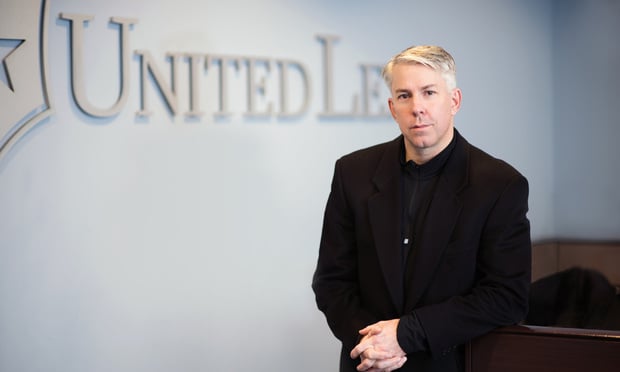Big Law Looks On as 'New Law' Gets Closer to Clients
A deal to outsource a portion of DXC Technology Co.'s legal department to UnitedLex Corp. may have long-term effects for law firms.
December 07, 2017 at 03:43 PM
7 minute read
 UnitedLex CEO Daniel Reed
UnitedLex CEO Daniel ReedEastman Kodak Co. made history in 1989 when it hired International Business Machines Corp. to manage its computers in what is widely regarded as the first information technology outsourcing deal in corporate American history.
The trend caught on quickly, with Fortune magazine reporting two years later that half of all major U.S. companies had at least done an IT outsourcing review.
Legal departments may have just seen their own Kodak moment.
Nearly 200 members of the in-house legal department at Fortune 200 technology services company DXC Technology Co., including some of its senior lawyers, are getting a paycheck from a new employer, UnitedLex Corp., in what is being billed as the first major outsourcing deal involving a law department.
“There is nothing revolutionary about what's happening here,” said William Henderson, a professor at the Indiana University Maurer School of Law who studies changes in the legal market. “The only thing revolutionary is that it's happening in legal.”
➤➤ For more on new players shaking up the legal industry, read The Law Firm Disrupted, a weekly email briefing by Roy Strom. Sign up here.
Under a five-year contract, UnitedLex will have a team of more than 250 lawyers and professionals handle contract management and immigration matters for DXC, while also negotiating deals worth “tens of billions” for the Tysons Corner, Virginia-based company, among other functions.
The deal was implemented within 180 days and has cut DXC's legal department costs by 30 percent, said UnitedLex, whose CEO Daniel Reed, a former senior associate at Greenberg Traurig, spoke about the transaction with sibling publication Corporate Counsel.
The deal also ushers in-house lawyers into the so-called rebadge economy, while accelerating a post-financial crisis trend of law departments being “run like a business.” If widely adopted, legal department outsourcing may have a longer-term drag on law firms, even if few industry participants see the UnitedLex-DXC deal as a major short-term threat to Big Law. Most of the work UnitedLex will assume was already being handled by in-house lawyers.
“I don't think it's any newer of a threat than what has been in place over the last several years as the rise of [legal process outsourcers] has been continuing and well-documented,” said Keith Maziarek, senior director of client value at Perkins Coie.
DXC is itself an IT outsourcing company created by the merger last year of Computer Sciences Corp. (CSC) and the enterprise services division of Hewlett Packard Enterprise Co. DXC had a goal to cut $1 billion in costs in the first year as a merged company, spurring the company's general counsel William Deckelman, a former in-house legal chief at CSC, to look for new ways to run his department.
Founded in 2006 and backed by a private equity arm of JPMorgan Chase & Co., Overland Park, Kansas-based UnitedLex is among the largest alternative legal service providers, with over 2,000 employees who are mostly lawyers and engineers. Reed said his company is already on-site at other major corporations and will soon be finalizing similar outsourcing deals.
UnitedLex is not the only “new law” service provider that has a contract to handle a portion of a law department's work. In December 2016, Axiom Law announced a five-year deal to manage contracts for Johnson & Johnson Services Inc., a subsidiary of the pharmaceutical giant.
Al Giles, a former managing associate at Linklaters who serves as Axiom's head of commercial, at the time called the Johnson & Johnson Services deal “the progression from an artisanal approach to a model that applies standardization, automation and process.”
Bruce MacEwen, a consultant to the legal industry at Adam Smith Esq., predicts the market for “new law” legal services such as that provided by UnitedLex will grow from $2 billion in 2015 to some $55 billion in 2025.
Still, the UnitedLex-DXC deal is unlikely to have much of an immediate effect on demand for law firm services.
Reed said less than 10 percent of the work his company will now handle for DXC would have previously been done by outside law firms. Most of the efficiency gains UnitedLex achieved were through implementation of a contract management system; redesigning internal workflows; and deploying teams of lawyers in geographies across the globe.
In that way, Reed said UnitedLex offers a service law firms mostly don't: A front-to-back redesign of how the legal department operates with an eye toward minimizing costs and boosting efficiency.
“Law firms don't have the right to feel threatened from this,” Reed said. “Because, No. 1, it's not something that is completely antagonistic to them. But also, law firms couldn't do it. They don't have the platform to do it.”
Even if law firms wanted to reimagine a client's legal department in this way, one inhibitor for them is the large upfront investment that UnitedLex has made in DXC's work.
The company brought on nearly 200 new employees. A group of internal consultants spent about four months at DXC scoping the legal department's work. UnitedLex has also spent five years developing a proprietary data management software, and eight years developing a contract management platform, Reed said.
Law firm partnerships are restricted from making that kind of investment by rules prohibiting nonlawyer ownership and their end-of-year profit payouts to partners. Law firms' budgets for investing in clients simply don't compare to UnitedLex's, Reed said.
“It's kind of like competing in the Major Leagues and you're the Oakland A's competing against the New York Yankees,” Reed said. “You're competing with a $15 million budget against a team with a $400 million budget.”
(The Yankees had a $227 million payroll in 2017, compared to $86 million on the books for the A's, a team whose management helped revolutionize baseball.)
Even so, the deal between both companies could be a harbinger of a new contracting model for law firms. If service providers such as UnitedLex were to be hiring and paying law firms, the call for law firm efficiency might only amplify.
“This is yet another signal to law firms that companies view their legal work much differently than law firms do,” said former Davis Polk & Wardwell and Heller Ehrman associate Josh Rosenfeld, now an executive at alternative service provider QuisLex. “It just re-emphasizes the message companies have been trying to get through the head of law firms that legal services, the way they're being currently delivered, are really inefficient and expensive.”
The UnitedLex-DXC deal may also represent a turning point in the continued expansion of in-house legal departments, said IU's Henderson. In-house legal departments have been adding lawyers to do work traditionally done by law firms for roughly the past decade.
“I think we've reached the final stages of corporations just adding more [full-time employees] to deal with risk management and cost containment,” Henderson said. “You can't outsource it to law firms to save money. But you can outsource it to some of these new vendors and really see that you're saving money.”
This content has been archived. It is available through our partners, LexisNexis® and Bloomberg Law.
To view this content, please continue to their sites.
Not a Lexis Subscriber?
Subscribe Now
Not a Bloomberg Law Subscriber?
Subscribe Now
NOT FOR REPRINT
© 2025 ALM Global, LLC, All Rights Reserved. Request academic re-use from www.copyright.com. All other uses, submit a request to asset-and-logo-licensing@alm.com. For more information visit Asset & Logo Licensing.
You Might Like
View All
KPMG Wants to Provide Legal Services in the US. Now All Eyes Are on Their Big Four Peers

Many LA County Law Firms Remain Open, Mobilize to Support Affected Employees Amid Historic Firestorm

Legal Tech's Predictions for the Business of Law in 2025

Thwarting of $14B US Steel Deal Won't Dampen Japan-U.S. M&A, Lawyers Say
Trending Stories
- 1Public Notices/Calendars
- 2Monday Newspaper
- 3Judicial Ethics Opinion 24-98
- 4'It's Not Going to Be Pretty': PayPal, Capital One Face Novel Class Actions Over 'Poaching' Commissions Owed Influencers
- 511th Circuit Rejects Trump's Emergency Request as DOJ Prepares to Release Special Counsel's Final Report
Who Got The Work
Michael G. Bongiorno, Andrew Scott Dulberg and Elizabeth E. Driscoll from Wilmer Cutler Pickering Hale and Dorr have stepped in to represent Symbotic Inc., an A.I.-enabled technology platform that focuses on increasing supply chain efficiency, and other defendants in a pending shareholder derivative lawsuit. The case, filed Oct. 2 in Massachusetts District Court by the Brown Law Firm on behalf of Stephen Austen, accuses certain officers and directors of misleading investors in regard to Symbotic's potential for margin growth by failing to disclose that the company was not equipped to timely deploy its systems or manage expenses through project delays. The case, assigned to U.S. District Judge Nathaniel M. Gorton, is 1:24-cv-12522, Austen v. Cohen et al.
Who Got The Work
Edmund Polubinski and Marie Killmond of Davis Polk & Wardwell have entered appearances for data platform software development company MongoDB and other defendants in a pending shareholder derivative lawsuit. The action, filed Oct. 7 in New York Southern District Court by the Brown Law Firm, accuses the company's directors and/or officers of falsely expressing confidence in the company’s restructuring of its sales incentive plan and downplaying the severity of decreases in its upfront commitments. The case is 1:24-cv-07594, Roy v. Ittycheria et al.
Who Got The Work
Amy O. Bruchs and Kurt F. Ellison of Michael Best & Friedrich have entered appearances for Epic Systems Corp. in a pending employment discrimination lawsuit. The suit was filed Sept. 7 in Wisconsin Western District Court by Levine Eisberner LLC and Siri & Glimstad on behalf of a project manager who claims that he was wrongfully terminated after applying for a religious exemption to the defendant's COVID-19 vaccine mandate. The case, assigned to U.S. Magistrate Judge Anita Marie Boor, is 3:24-cv-00630, Secker, Nathan v. Epic Systems Corporation.
Who Got The Work
David X. Sullivan, Thomas J. Finn and Gregory A. Hall from McCarter & English have entered appearances for Sunrun Installation Services in a pending civil rights lawsuit. The complaint was filed Sept. 4 in Connecticut District Court by attorney Robert M. Berke on behalf of former employee George Edward Steins, who was arrested and charged with employing an unregistered home improvement salesperson. The complaint alleges that had Sunrun informed the Connecticut Department of Consumer Protection that the plaintiff's employment had ended in 2017 and that he no longer held Sunrun's home improvement contractor license, he would not have been hit with charges, which were dismissed in May 2024. The case, assigned to U.S. District Judge Jeffrey A. Meyer, is 3:24-cv-01423, Steins v. Sunrun, Inc. et al.
Who Got The Work
Greenberg Traurig shareholder Joshua L. Raskin has entered an appearance for boohoo.com UK Ltd. in a pending patent infringement lawsuit. The suit, filed Sept. 3 in Texas Eastern District Court by Rozier Hardt McDonough on behalf of Alto Dynamics, asserts five patents related to an online shopping platform. The case, assigned to U.S. District Judge Rodney Gilstrap, is 2:24-cv-00719, Alto Dynamics, LLC v. boohoo.com UK Limited.
Featured Firms
Law Offices of Gary Martin Hays & Associates, P.C.
(470) 294-1674
Law Offices of Mark E. Salomone
(857) 444-6468
Smith & Hassler
(713) 739-1250










